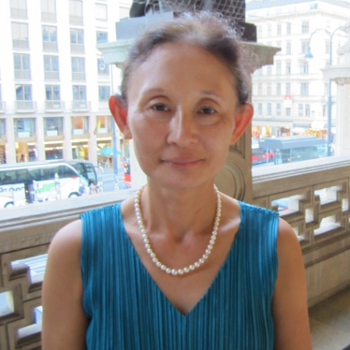The first performance of Eugene Onegin at the Met this season, a revival of Deborah Warner’s 2011 London production, was remarkable in two ways. Anna Netrebko combined her vocal maturity and supreme acting to give us a complete "flesh and bones" character. Her Tatyana evolved in front of our eyes throughout the evening. A shy bookish girl in a rural estate blushes with joy and hope at her first encounter with her attractive neighbor, Onegin. Driven by passion and desire, she pens a letter confessing her love for him, regretting immediately after sending it. Her reaction to Onegin’s rejection was heartbreaking.
Netrebko carried her humiliation to a party in her honor, where she witnessed Onegin destroy the relationship between his best friend, Lensky, and Tatyana's sister, Olga. Several years later, she is a wife of a dignified prince in court, and now being pursued by Onegin, reminds him of his previous rejection of her, leaving him in despair whilst confessing her love for him. Netrebko’s singing was at times quiet and subtle, other times full throated and thrilling. Her middle voice had an attractive velvety quality, and she could blast emotional high notes but could also modulate them in breathtaking pianissimos. She invested meaning and emotion in every note and phrase. The Letter Scene was a perfect showcase for her vocal agility and power, but the most heartbreaking moment came at the end of the opera, during her encounter with Onegin, when she sang quietly to herself “Happiness was within our reach… so close,” joined by her Onegin, Mariusz Kwiecień, in their beautiful duet of life’s sorrow and regret. A tour de force.
The other star of the evening was the Metropolitan Opera Orchestra led by Robin Ticciati. Starting with a hushed and subdued prelude, Mr Ticciati was keen to bring out intricate textures of music rather than being swept up with Tchaikovsky’s emotional melodies. The Letter Scene was enhanced by nuanced support from the pit. The two party scenes with dance music showed the orchestra at their symphonic best. The strings and woodwinds stood out. The oboe accompanying Lensky’s aria was noble and poignant, violins exploring the most subtle complexity of the score opened our ears to the music’s beauty. Double basses happily dug into the depths of human despair. Trumpets’ regal brilliance enhanced the party scenes. The musicians were adept at following Mr Ticciati’s frequent tempo and dynamic shifts.
Warner’s production works best in Acts 2 and 3, with well-choreographed movement in attractive settings. Act 1 is hampered by a cluttered hall of the estate, with servants coming and going in the first half, but the revival saw many unnecessary details streamlined or eliminated to good effect. Each scene is preceded by a screen showing video images of Russian landscape. Lighting was effective in the duel scene and the final encounter in the snow, to delineate the characters in their stark aloneness.
As Onegin, Mr Kwiecień was a suave presence on stage, with a steady and muscular baritone to match the self-centered protagonist. While his was a powerful and virile voice, one might have wished for more shading of his tone at times, which he only provided in his final duet. Alexey Dolgov embodied an awkward bespectacled poet who perishes through his own idealism in his somewhat exaggerated, but effective, acting. His voice was clear and bright and yet had grainy color; he brought his ardor and pathos to his farewell aria. Elena Zaremba as Madame Larina, Larissa Diadkova as Tatyana’s nurse, and Elena Maximova as Olga, all contributed well to the ensemble. Štefan Kocán, reprising his Prince Gremin, nearly stole the show with his aria of his declaration of love for his wife. His singing was elegant and stylish, with his strong bass showing remarkable flexibility. Given one of the most gorgeous melodies penned by Tchaikovsky in this opera, Mr Kocán excelled not only in his high notes that opened up in a luxurious and prolonged phrasing, but in his remarkable scaling of low notes at the end.
The evening, at nearly four hours including two intermissions, seemed to fly by. At the end, each cast member took a bow bearing a single white rose, in honor of Mr Dmitri Hvorostovsky, who was scheduled to sing Onegin here but withdrew to continue his treatment. It was a touching and fitting tribute.




